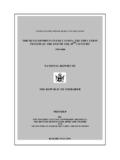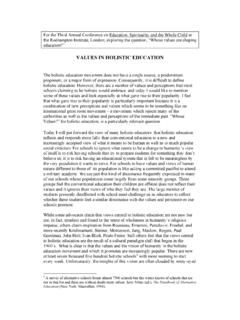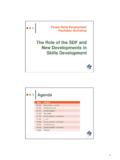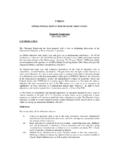Transcription of Global health promotion scaling up for 2015 - A …
1 Background Document, unedited draft, 23-01-05 Unedited Working Paper, 14-07-2005 Global health promotion scaling up for 2015 - A brief review of major impacts and developments over the past 20 years and challenges for 2015. WHO Secretariat Background Document for the 6th Global Conference on health promotion in Bangkok, Thailand 7-11 August 2005. Purpose of the paper The purpose of this background paper is to establish a common frame of reference for the participants of the Bangkok conference in August 2005. It provides a short review of the origins of the health promotion concepts and approaches, presents some major developments in health promotion since the adoption of the Ottawa Charter for health promotion and highlights some of the major present day challenges in health and health promotion .
2 It provides orientation for some of the key issues that will be presented and debated in the four tracks of the Bangkok conference and identifies issues that can inform the completion of the Charter to be adopted at the Bangkok conference. It should be noted that the scope of this background paper is neither to be extensive, nor to provide a health promotion handbook. The status of the paper is still a draft. It will capitalize on contributions made during the conference and can potentially also expand on items that cannot be accommodated in the Bangkok Charter. A final version will be compiled after the Bangkok Conference Process of the paper This draft of the Background Document is based on comments and complementary texts from the BCDG members and the WHO secretariat and was first drafted by a small working team on 13-14 January 2005 in Geneva.
3 It will be distributed to the COC and PC in the first half of January together with a new draft of the Bangkok Charter and will be open for comments until 31 January 2005. At the beginning of February, updated documents will be circulated for discussion at the next Programme Committee Meeting which will be held in Kobe, Japan, on 21-23 February 2005. Comments made at the meeting in Kobe, further discussions and fora organized by the Conference and the Secretariat and comments delivered on the draft Charter versions have been considered. The Background Document will be made available to all participants at the Bangkok Conference and serve as a guiding document for the Bangkok Charter and the technical discussions.
4 It is not subject to any organized discussions as part of the programme during the conference, but comments to the Conference Secretariat are welcome. A final version will be part of the proceedings and compiled after the Bangkok Conference, complementary drawing on the contributions from the key note speeches and technical papers as well as from the discussions they generate. 1 Background Document, unedited draft, 23-01-05 Note, both the para s on leadership and sustainable funding (p. 13) should be in consistence with the draft charter. 2 Background Document, unedited draft, 23-01-05 Introduction on values, key principles and some historic milestones health promotion began to gain acceptance worldwide after the launching of the Ottawa Charter for health promotion at the first international health promotion conference held in Ottawa, Canada 1986 and jointly organized by health and Welfare Canada and the Canadian Public health Association under the leadership of the World health Organization.
5 The Charter was based on the health for All Strategy, the Alma Ata Declaration and inspired by the Canadian health Minister Marc Lalonde s health field concept . It introduced a focus on health and its determinants into a debate that so far was dominated by a biomedical approach to health . One aim of the Charter was to engage the industrialized world in applying the health for All principles of equity, empowerment and intersectorality to its highly developed health care systems and to reiterate the importance of public health action. It proposed a revolutionary shift in perspective that underlined the contribution of other policy sectors in health creation as well as the central role of individuals and communities in contributing to health .
6 In doing so, the Ottawa Charter introduced lessons learnt in the developing world to the developed countries. health promotion was defined in the Charter as a process of enabling people to increase control over, and to improve their health . This was reinforced by the new approaches advocated by social movements in the 1970ies and 80ies - such as the women's movement and the environmental movement. It also built on new types of health programmes in the developed world that moved beyond a focus on individual risk behaviour towards "making the healthy choice the easier choice" through a wide range of environmental and social interventions. In the developing world health promotion catalyzed a bridge between environmental concerns for access to clean water and sanitation, food supply, safety, reproductive health and health education.
7 The process of the Ottawa Charter was scientifically facilitated by a document on concept and principles and a significant number of preparatory meetings which contributed to the clarification of the health promotion concept, its values and principles and its approaches. From this intensive debate before and at the conference emerged the five action areas of the Ottawa Charter - Develop healthy public policy - Create supportive environments for health - Strengthen community action - Develop personal skills - Reorient health services. In doing so, it brought together both existing and new ideas in one document, and gave them currency and status by being part of the WHO movement towards health for all. But the Charter went one step further and set forth a new mindset and ethos for health professionals and associates in the wider public health field, defining their role as being to advocate, enable and mediate for health .
8 It proposed a salutogenic view on health which focuses on strengthening peoples health potential and which is aimed at whole populations over the life-course. It underlined that all people have their individual health potential, even if living with severe disease or disability. It reinforced the direction set by the health for All Strategy to view the goal of health policy and health programmes as "providing people with the opportunity to lead a socially and economically productive life." 3 Background Document, unedited draft, 23-01-05 Key values and principles The enjoyment of the highest attainable standard of health is one of the fundamental rights of every human being without distinction of race, religion, political belief, economic or social condition.
9 This statement in the preamble of the WHO Constitution, - with the inclusion of gender - sets out the point of departure for the key values driving health promotion . Human rights are as fundamental for health promotion as they are for the mission of the health sector as a whole. The shared goals are to improve the health of people, respect their diversity and maintain their dignity. More recently these goals have been expanded to include sustainable development and highlight the need to address the issue of maintaining a sustainable eco-system without which long-term survival and health is seriously threatened and makes the world harder to live in for tomorrow s children and generations to follow.
10 health rights are embedded in a humanitarian, social and political context and are subject to changing historical perceptions. Six key links between rights and health have been reinforced by health research: The right to health is related to both political and democratic rights, as well to rights against any discrimination. Equal life opportunities for women and men are basic pre-requisites in achieving each one s highest health potential. health status is determined by social structures and by the options available to people to participate and influence the society in which they live and work. Safe and health -supportive environments including access to safe water, sanitation, decent housing, protection against violence and sufficient nutritious food supply are all means to provide equitable conditions for maintaining and improving health and quality of life for all people.















